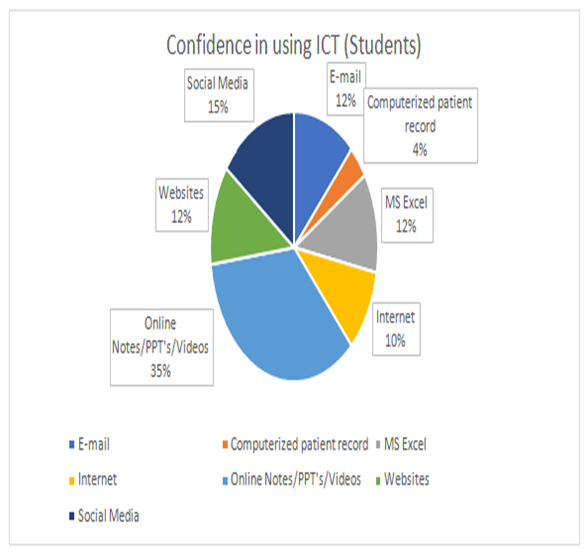
Impact of Integrating ICT in Teaching and Learning Surgery for Students and CRRIS: An Institutional Study
Abstract
Background:In present-day Competency-based medical education, Information and communication tools play a very significant role. Integrating ICT has opened up new avenues in synchronous and asynchronous teaching-learning both on and off the campus. With easy affordability and availability of the latest communication devices, hi-speed internet, and free campus Wi-Fi, it is believed that ICT in medical education helps the medical students, who are digital natives and teachers in pedagogical teaching, learning assessment, and feedback.
Methods: This cross-sectional questionnaire-based study, included 100 students in their final year and CRRIS’ in the department of General Surgery, at Karpaga Vinayaga Institute of Medical Sciences and Research Centre for 6 months from December 2020 to June 2021. The data were analysed using SPSS version for both descriptive and inferential statistics
Aim: To assess the impact of integrating ICT as a teaching-learning tool, in knowledge and skills development and to assess the students’ attitude and perceptions of ICT application in teaching-learning and skills development in Surgery. A total of 200 participants were provided with a prevalidated printed questionnaire.
Results: The medical students’ knowledge, applications, familiarity with different search engines, and confidence in using digital resources are found to be very encouraging and comparable to the students of developed countries.
Conclusion: Technology-enabled learning using ICT will definitely make teaching-learning more interactive, student-centric, flexible, and engaging. Faculty development programs for teachers help in the effective implementation of ICT.
Keywords: Information and communication technology, CBME, Teaching and learning process, Faculty development programs Surgery.
Full Text:
PDFReferences
Ekenze SO, Okafor CI, Ekenze OS, Nwosu JN, Ezepue UF. The Value of Internet Tools in Undergraduate Surgical Education: Perspective of Medical Students in a Developing Country. World J Surg. 2017 Mar;41(3):672-680. doi: 10.1007/s00268-016-3781-x. PMID: 27812808.(I)
Kumta SM, Tsang PL, Hung LK, Cheng JC. Fostering critical thinking skills through a web-based tutorial programme for final year medical students-A randomized controlled study. J EducMultimed Hypermedia. 2003;12:267–73. [Google Scholar]
Riley JB, Austin JW, Holt DW, Searles BE, Darling EM. Internet-based virtual classroom and educational management software enhance students' didactic and clinical experiences in perfusion education programs. J Extra Corpor Technol. 2004 Sep;36(3):235-9. PMID: 15559740.#
Vyas R, Anshu H, Burdick W, Singh T. Application of classroom good teaching practices to an online faculty development programme in India. South-East Asian J Med Educ. 2010;4:14–7. [Google Scholar]
Tom T. The History of Online Education. Weblog. [Last accessed on 2020 Jun 04]. Available from: https://www.petersons.com/blog/the-history-of-online-education/
O'Doherty D, Dromey M, Lougheed J, Hannigan A, Last J, McGrath D. Barriers and solutions to online learning in medical education An integrative review. BMC Med Educ. 2018;18:130. [PMC free article] [PubMed] [Google Scholar]
Mahajan R, Gupta P, Singh T. Massive open online courses: Concept and implications. Indian Pediatr. 2019;56:489–95. [PubMed] [Google Scholar]
Ruiz JG, Mintzer MJ, Leipzig RM. The impact of E-learning in medical education. Acad Med. 2006;81:207–12. [PubMed] [Google Scholar]
.Cook DA. The value of online learning and MRI: Finding a niche for expensive technologies. Med Teach. 2014;36:965–72. [PubMed] [Google Scholar]
Ellaway R, Masters K. AMEE Guide 32: E-Learning in medical education Part 1: Learning, teaching and assessment. Med Teach. 2008;30:455–73. [PubMed] [Google Scholar]
Kadam SS, Bagle TR, Baviskar PA. Utilization of internet by undergraduate medical students. Natl J Physiol Pharm Pharmacol. 2018;8:1–6. [Google Scholar]
Pei L, Wu H. Does online learning work better than offline learning in undergraduate medical education? A systematic review and meta-analysis. Med Educ Online. 2019;24:1666538. [PMC free article] [PubMed] [Google Scholar]
Taha M, Abdalla M, Wadi M, Khalafalla H. Curriculum delivery in Medical Education during an emergency: A guide based on the responses to the COVID-19 pandemic. MedEdPublish. 2020;9:69. [Google Scholar]
McLaughlin M, Brame D. The Best Video Conferencing Software for. 2020. [Last accessed on 2020 Mar 29]. Available from: https://www.pcmag.com/picks/the-best-video-conferencing-software
Sutterlin J. Learning is social with zoom video conferencing in your classroom. eLearn Magazine. 2018. [Last accessed 2020 Jun 04]. Available from: https://elearnmag.acm.org/featured.cfm?aid=3236697 .
Baig M, Gazzaz ZJ, Farouq M. Blended learning: The impact of blackboard formative assessment on the final marks and students' perception of its effectiveness. Pak J Med Sci. 2020;36:327–32. [PMC free article] [PubMed] [Google Scholar]
Sutherland S, Jalali A. Social media as an open-learning resource in medical education: Current perspectives. Adv Med EducPract. 2017;8:369–75. [PMC free article] [Pub Med] [Google Scholar]
Chickering AW, Gamson ZF. New Directions for Teaching and Learning: Applying the Seven Principles for Good Practice in Undergraduate Education. San Francisco: Jossey-Bass Publishers; 1991. [Google Scholar]
Vyas R, Anshu H, Burdick W, Singh T. Application of classroom good teaching practices to an online faculty development programme in India. South-East Asian J Med Educ. 2010;4:14–7. [Google Scholar]
Singh T, Gupta P, Singh D. Principles of Medical Education. 4th ed. New Delhi: JaypeeBrothers Medical Publishers; 2013. [Google Scholar]
Ramachandran K, Faith M. Design and evaluation of faculty development workshop for teaching, learning and assessment using E-resources in an Indian medical school. South-East Asian J Med Educ. 2020;13:56. [Google Scholar}
Refbacks
- There are currently no refbacks.

This work is licensed under a Creative Commons Attribution-NoDerivatives 4.0 International License.
An Initiative of The Tamil Nadu Dr MGR Medical University
 University Journal of Surgery and Surgical Specialities
University Journal of Surgery and Surgical Specialities